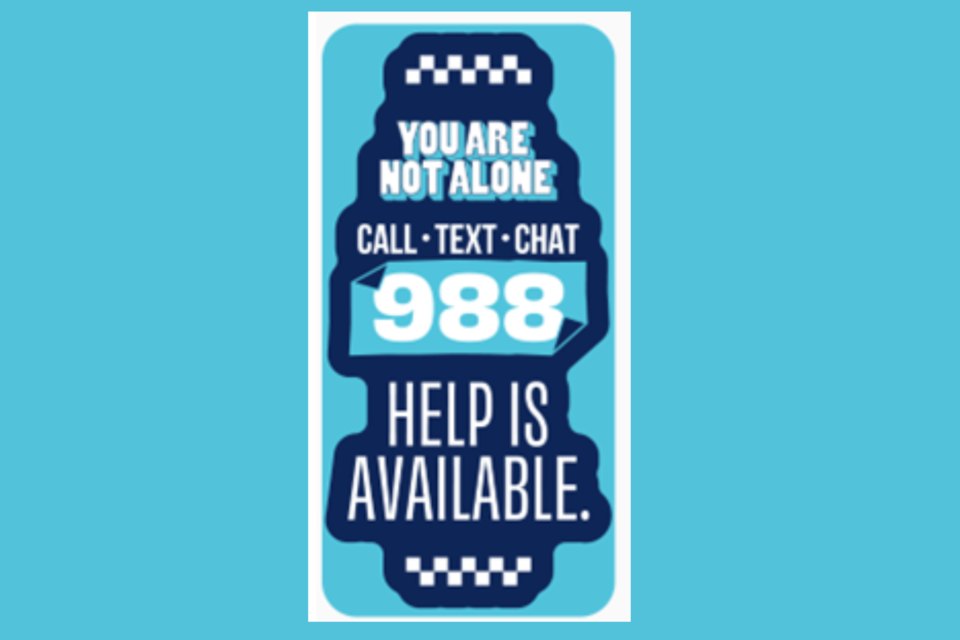The Georgia Department of Behavioral Health and Developmental Disabilities (DBHDD) has joined forces with the University System of Georgia (USG) in a groundbreaking effort to combat student suicides and increase awareness of mental health support services.
“Partnering with the University System of Georgia on this vital initiative underscores our commitment to the mental health and well-being of young adults across the state,” said Commissioner Kevin Tanner. “The placement of 988 decals in residence hall rooms will serve as a constant reminder to students that confidential help is always available, and they are not alone.”
The initiative includes placing 988 window decals (attached) in every residence hall room across all public colleges and universities in Georgia, offering a lifeline to students in crisis. In addition, 988 wallet cards will be distributed to faculty, staff, and students.
This partnership is part of a broader effort under the USG's Mental Health Initiative (MHI), launched in 2020, which aims to significantly expand mental health services for all USG students.
Dr. Scot Lingrell, USG's Vice Chancellor for Enrollment Management & Student Affairs, also expressed his support for the initiative.
“Our students’ mental health is a top priority, and this partnership with DBHDD helps raise awareness and get them help when they need it,” said Dr. Lingrell. “The addition of the 988 Lifeline expands on USG’s work to significantly expand student mental health services across Georgia and make sure our students succeed.”
These efforts are further supported by distributing approved marketing materials and providing mental health training, awareness programs and education to the entire USG community.
Addressing a Critical Need
According to recent statistics, suicide is the second leading cause of death among young people aged 18-24 in Georgia.
In 2022 alone, the state saw a troubling increase in suicides within this age group, underscoring the urgent need for enhanced mental health support and resources on college campuses.
Taking Action
The rollout of the 988 window decals will begin in the fall semester of 2024, with the goal of having all residence hall rooms across Georgia’s public colleges and universities equipped with this critical messaging. This effort is part of a comprehensive strategy under the MHI to expand mental health resources.
USG will distribute 988 information stickers across residence halls, student activity centers, and health centers, reaching an estimated 200,000 students. Wallet cards will be distributed to all campus police departments and academic affairs leaders to reach faculty, staff, and law enforcement personnel.
About the Mental Health Initiative (MHI)
The MHI, launched in 2020, aims to significantly expand mental health services for USG students. As a result, all students have access to 24/7 clinical phone support, virtual counseling sessions, psychiatric prescribing, on-demand wellness resources, and multiple mental health training sessions. This comprehensive initiative reflects a commitment to creating a culture of care and support within the higher education community.
About the Georgia Department of Behavioral Health and Developmental Disabilities
The Georgia Department of Behavioral Health and Developmental Disabilities provides treatment and support services to people with mental illnesses and addictive diseases and assists individuals with developmental disabilities to live meaningful lives in their communities.
About the University System of Georgia
The University System of Georgia is composed of 26 public institutions of higher learning, providing high-quality education and promoting the well-being of students across the state. USG is committed to fostering academic excellence, research, and service to benefit Georgia and beyond.
Additional Information:
- In 2022, there were 185 suicide deaths reported among persons aged 18-24 years in Georgia. (GA DPH OASIS)
- In the past five years (2018-2022), there have been 912 suicide deaths reported among persons aged 18-24 years in Georgia.
- In 2022, Georgia had a higher suicide rate among 18–24-year-olds (17.4 per 100,000) compared to both the rate for the Southern states (16.9 per 100,000) and the national rate (15.8 per 100,000). (CDC WISQARS Injury Data)
- The suicide rate among males aged 18-24 years (27.4 per 100,000) was more than four times the suicide rate among females aged 18-24 years (6.6 per 100,000) in 2022. (GA DPH OASIS)
- However, looking at the same year, a higher proportion of females (64%) accounted for ER visits and hospital discharges related to intentional self-harm (including suicide attempts) in comparison to males (36%). [Note: intentional self-harm and suicide attempts are underreported—not all of them are reported/treated in medical settings]
- In 2022, the suicide rate among those aged 18-24 years was highest among Black or African American persons (18.9 per 100,000), followed by White persons (16.8 per 100,000), and then followed by Other (12.2 per 100,000). [“Other” includes Asian, Native Hawaiian/ Other Pacific Islander, American Indian/Alaska Native, Multiracial, and Unknown race] (GA DPH OASIS)
- The suicide rate among persons aged 18-24 years was higher among non-Hispanic persons (17.6 per 100,000) than among Hispanic persons (14.5 per 100,000) in 2022. (GA DPH OASIS)
- Over the past five years (2018-2022), the suicide rate among persons aged 18-24 years in Georgia increased by approximately 5.3%. (GA DPH OASIS)
- Over the past decade (2013-2022), the suicide rate among persons aged 18-24 years in Georgia increased by approximately 42%. (GA DPH OASIS)




